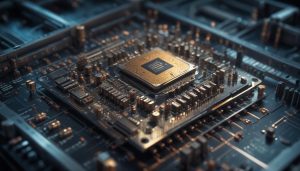Artificial Intelligence Advances You Might Not Expect
Aiden Foster August 21, 2025
Explore surprising progress in artificial intelligence that is shaping the future of tech and science. This guide uncovers real-world examples, ethical debates, and the impact of machine learning, neural networks, and automation—all presented in a way that sparks curiosity and deeper understanding.
The Evolving Landscape of Artificial Intelligence
Artificial intelligence (AI) continues to expand, influencing nearly every industry. While many imagine AI mainly in robotics, its reach now includes fields such as healthcare, finance, and entertainment. Rapid advancements in machine learning—where algorithms learn from data—are paving the way for automated decision-making and previously unimagined applications. For instance, AI-powered systems can analyze massive datasets faster than any human, leading to innovative breakthroughs in drug discovery and climate modeling. These powerful tools enable researchers to identify patterns and make predictions with a speed and accuracy that is truly reshaping possibilities across science and society.
One of the most remarkable aspects of AI is the evolution of neural networks. Modeled after the human brain, these networks are designed to process complex information using interconnected algorithms. Today’s deep learning architectures can recognize speech, translate languages, and even write coherent text. Technologies relying on deep neural networks, such as self-driving cars and image recognition software, founder on data and pattern recognition—capabilities that improve as more data becomes available. This has led to a virtuous cycle: the more these systems are used, the smarter and more accurate they become. (Source: https://www.nature.com/articles/d41586-018-05707-8).
Despite this remarkable progress, AI development has also raised significant concerns around privacy, ethical usage, and misinformation. Powerful algorithms can be abused to produce highly convincing deepfakes or to spread content that looks genuine. As a result, researchers and industry leaders are collaborating to develop ethical frameworks and transparent guidelines for responsible AI use. Many organizations encourage the adoption of open standards and independent audits to address concerns about bias in automated decision-making. The future of AI will likely be shaped not only by technical capability, but also by how thoughtfully these tools are governed and integrated into society.
Machine Learning: The Engine Behind Smart Technologies
At the core of many recent tech breakthroughs lies machine learning. This subset of AI involves computers “learning” from vast streams of information—recognizing patterns, improving accuracy, and providing solutions not explicitly programmed. Think voice assistants, recommendation engines, or self-diagnosing medical devices. They all use machine learning to adapt and respond intelligently. With increased access to big data and more efficient processing chips, machine learning models are becoming incredibly sophisticated, capable of making predictions that were science fiction just a decade ago.
Sectors reaping the rewards of machine learning technology include healthcare and finance. In medical research, predictive models analyze images, identifying subtleties invisible to the human eye, and supporting early detection of diseases. Finance professionals harness these predictive analytics to forecast market fluctuations, assess risk, and improve portfolio management. This combination of speed and insight can lower costs, improve outcomes, and support better decision-making at scale. What makes machine learning so unique is its ability to continually evolve by learning from errors and successes, further refining its recommendation and classification accuracy. (Source: https://www.nibib.nih.gov/science-education/science-topics/artificial-intelligence).
Yet, integrating machine learning into everyday life brings up questions about transparency and fairness. As algorithms automate more of our choices, understanding their decision-making processes becomes crucial. Academics and regulators are now demanding explainable AI—systems that can describe how conclusions were drawn—to support accountability. This shift marks a new phase in machine learning, where clarity and trust matter as much as raw performance. Companies investing in AI are increasingly focusing on building systems that are not only powerful but understandable and equitable for all users.
Neural Networks: Learning from the Brain
Neural networks, inspired by the way human brains process information, are central to today’s AI boom. These computing systems consist of layers of artificial “neurons” that collaborate to solve complex tasks. For example, convolutional neural networks enable machines to identify objects in photos by recognizing distinct patterns of pixels. This same principle is applied in voice recognition, text analysis, and even predictive maintenance for industrial equipment. With every interaction, neural networks can get better—adapting to new data and user behavior over time.
Modern neural networks power tools that translate between languages, navigate traffic in real time, and compose music or text. The largest models—sometimes containing billions of neural connections—deliver results approaching human-like performance in some contexts. AI-driven chatbots, recommendation systems, and creative engines are becoming more responsive and context-aware with each technical leap. This dynamic, ongoing learning helps systems thrive in unpredictable, real-world environments. (Source: https://www.scientificamerican.com/article/deep-learning-ai/).
However, building effective neural networks is no simple feat. Robust training requires massive amounts of clean, unbiased data and careful calibration. The process can consume significant computer power and energy, raising environmental questions as more companies deploy ever-larger AI models. Advances in efficient architecture and smarter algorithms seek to balance performance with eco-responsibility, opening new avenues for green computing and sustainable tech initiatives. Expect ongoing innovation as experts tackle these challenging, yet exciting, frontiers in computational science.
Automation’s Influence on Work and Society
Automation powered by artificial intelligence has transformed industrial sectors, reshaping traditional workflows and increasing operational efficiency. Factories now deploy smart robotics for repetitive tasks, while retail and logistics integrate predictive algorithms to streamline supply chains. AI-driven automation does not simply speed up routines—it enables companies to analyze real-time data, forecast demand, and adjust processes dynamically. The result? Leaner, more competitive organizations that can respond rapidly to changes in market needs or consumer preferences.
This shift, though positive for productivity, is prompting discussions about the future of work. As automation takes over routine jobs, workers are challenged to develop new skills. Multinational organizations, universities, and nonprofit groups are rolling out initiatives and free technology courses to support upskilling and resilience in the workforce. These emerging education programs focus on digital literacy, data analysis, and practical application of AI, helping professionals stay relevant. (Source: https://www.weforum.org/agenda/2020/10/reskill-skills-gap-future-of-work/).
Beyond employment, automation also impacts sectors such as healthcare, agriculture, and public safety. AI-enabled sensors help monitor crops, while predictive analytics improve resource allocation for first responders. These applications hold promise for addressing global challenges—from food security to disaster management. Nonetheless, the new wave of automation compels all sectors to balance efficiency with social responsibility, ensuring wide access to new opportunities while mitigating risks of displacement or inequality.
Ethical Frontiers and Responsible Innovation
The rapid pace of AI advancement brings profound ethical questions. Who is accountable if an AI system makes a wrong call? How can we ensure that automated decision-making remains bias-free and inclusive? Policymakers, ethicists, and technologists are collaborating to set out responsible innovation frameworks. For example, many advocate for transparency in AI training, insist on auditability, and propose regulations that keep safety and human values at the forefront. (Source: https://www.brookings.edu/research/ai-ethics-principles/).
The conversation around AI ethics is no longer limited to academia or think-tanks. Governments around the globe are launching initiatives and public consultations to align AI governance with broad societal goals. Topics such as data privacy, informed consent, and equitable access inform these discussions, driving the development of new international standards and guidelines. Initiatives like the European Union’s AI Act and the National Institute of Standards and Technology (NIST) AI Risk Management Framework signal a growing global consensus on the need for shared rules and best practices. (Source: https://www.nist.gov/artificial-intelligence).
Importantly, innovation and ethics need not be at odds. By designing responsible, transparent algorithms and promoting broad digital literacy, the tech industry can unlock the vast potential of AI while minimizing harm. Engaged, informed communities play a vital role in this process, pushing companies and institutions toward greater accountability and stewardship of the technologies shaping our shared future.
The Road Ahead: Emerging Trends and Challenges
As AI technology matures, new research areas are emerging—such as quantum computing, explainable AI, and human-AI collaboration. Quantum computing promises exponential increases in processing power, potentially enabling even more revolutionary applications. Explainable AI aims to increase the transparency of decision-making processes, building trust in automated systems and making them more useful in regulated industries like healthcare and finance. These trends create opportunities for academia, industry, and amateur innovators alike.
Human-AI collaboration will be a defining feature of the future. Rather than replacing people, next-generation systems are increasingly designed to assist, enhance, and expand human capabilities. For example, collaborative robots—or “cobots”—work alongside staff in factories, supporting repetitive or dangerous tasks, while clinicians partner with AI-driven diagnostic tools for improved patient care. This partnership paradigm expands what’s possible and lays the foundation for more inclusive growth. (Source: https://www.mckinsey.com/featured-insights/artificial-intelligence/ai-automation-and-the-future-of-work-ten-things-to-solve-for).
Of course, challenges remain. Ensuring broad access to cutting-edge technology, safeguarding personal data, and supporting continuous learning are just a few of the hurdles. In this dynamic environment, curiosity and education are essential—empowering individuals, communities, and organizations to harness the full benefits of AI while navigating its risks. Expect the next decade to be remarkable, where progress and caution go hand in hand for a smarter world.
References
1. Castelvecchi, D. (2018). Can we open the black box of AI? https://www.nature.com/articles/d41586-018-05707-8
2. National Institute of Biomedical Imaging and Bioengineering (NIBIB). (2023). Artificial Intelligence. https://www.nibib.nih.gov/science-education/science-topics/artificial-intelligence
3. Marcus, G. (2018). Deep Learning: A Critical Appraisal. Scientific American. https://www.scientificamerican.com/article/deep-learning-ai/
4. World Economic Forum. (2020). How to reskill for the future of work. https://www.weforum.org/agenda/2020/10/reskill-skills-gap-future-of-work/
5. West, D. M., Allen, J. R., & Sizer, T. (2021). AI ethics principles of the United States and European Union. Brookings Institution. https://www.brookings.edu/research/ai-ethics-principles/
6. National Institute of Standards and Technology (NIST). (2023). Artificial Intelligence. https://www.nist.gov/artificial-intelligence







